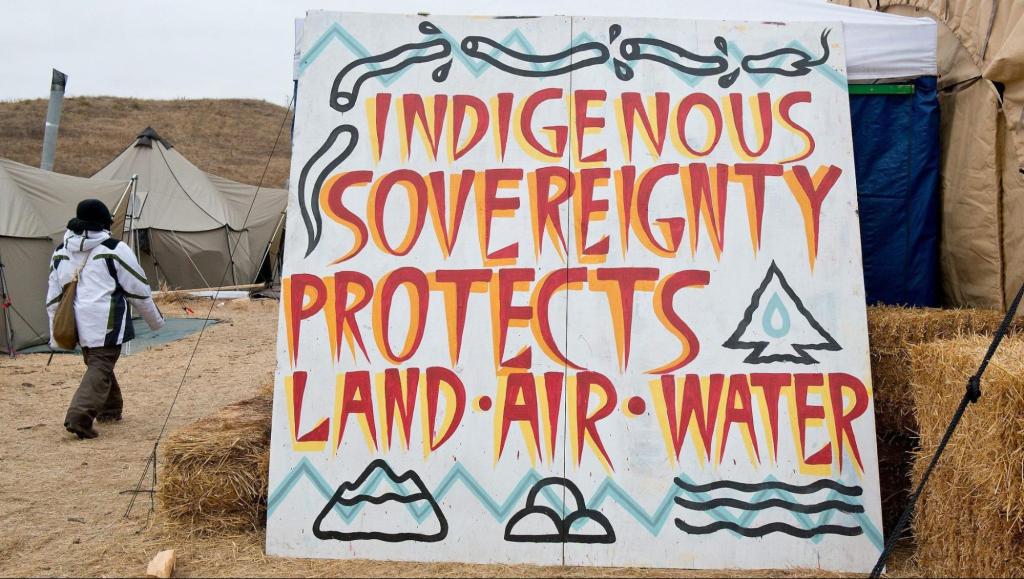
By now, you’ve no doubt become familiar with ongoing legal battles over the Dakota Access pipeline (DAPL). You may recall that I, myself, was targeted and faced years in prison. Fortunately, all serious charges against me were dropped as I prepared to present a comprehensive necessity defense outlining why I had no choice but to resist the pipeline and its threat to my homelands, our people, and Unci Maka, our Grandmother Earth. You might remember the Standing Rock Nation’s lawsuits to prevent the pipeline, and you also recently heard from me about my testimony in the trial between North Dakota and the federal government regarding who will split the costs of over-policing our peaceful protest camps.
Did you know that Energy Transfer, which operates the pipeline, has also targeted nonprofit organizations in the courts of law? Specifically — and preposterously — the oil company has gone after Greenpeace USA with a pair of lawsuits. Energy Transfer’s tactic is, unfortunately, increasingly popular. Extractive industry corporations seeking to suppress opposition to their exploitative projects file what’s known as a Strategic Lawsuits Against Public Participation (SLAPP). To give you another example, the lithium mine company operating at Thacker Pass is using SLAPP in an attempt to silence tribal activists, elders, and allies resisting the company’s destruction of Unci Maka and sacred sites on Paiute and Shoshone homelands.

A sign from a NoDAPL resistance camp perfectly sums up one reason why lawsuits against Greenpeace and other nonprofits are way off the mark. They discredit the Indigenous agency involved in frontline resistance movements.
Frankly, the latest lawsuit against Greenpeace is of a different magnitude — both in terms of the exorbitant amount of damages Energy Transfer is seeking and the specifics of the case. Greenpeace (and other entities resisting DAPL, including Standing Rock and other tribal nations) have evidence of clear legal violations committed by Energy Transfer in its rush to complete DAPL. Aware of the gravity of those violations and wanting to cast doubt on their veracity and rewrite the narrative, Energy Transfer has attacked Greenpeace with false allegations of defamation.
As Greenpeace has highlighted in this piece — which I strongly encourage you to read — none of the nine statements Energy Transfer claims as defamatory were originally made by Greenpeace. Rather, they were circulated publicly (and endorsed widely). I commend Greenpeace for hearing the call to join Native nations on the frontline of this fight and for accurately summarizing the problems with Energy Transfer’s SLAPP effort. Honestly, from our perspective, if you’re being sued for defamation by a major extractive industry corporation, you’re probably doing something right!
Of course, Native water protectors and land defenders are all too familiar with the oil company’s modus operandi. Our ancestors witnessed similar tactics when Indian agents exerted control over their lives in the wake of the Dawes Allotment Act. More recently, my parents, aunties, and uncles remember well the FBI’s attempt to infiltrate and destroy the American Indian Movement in the 1970s. Native Peoples understand deeply that a commitment to truth telling and justice invites backlash from wealthy and powerful interests — government, corporate, or both.
It’s extra important for us to have our allies’ backs now, as all of this is occurring against a stark backdrop: not only has DAPL already leaked many times, but it continues to operate without a valid Environmental Impact Study or easement to cross under the Missouri River upstream of Standing Rock. Furthermore, in 2022, Energy Transfer was convicted of criminal charges in connection to its disastrous operation of pipelines in Pennsylvania and Ohio. In other words, it’s essentially a criminal corporation committed to shifting blame onto activists fighting for environmental justice and tribal sovereignty. That’s why we’ll keep battling and shining the light of truth. We hope that despite all spurious and costly legal attacks, Greenpeace will, too. We are all in this fight together.
Wopila tanka — thank you for protecting water and advancing environmental justice!
Chase Iron Eyes
Director and Lead Counsel
The Lakota People’s Law Project